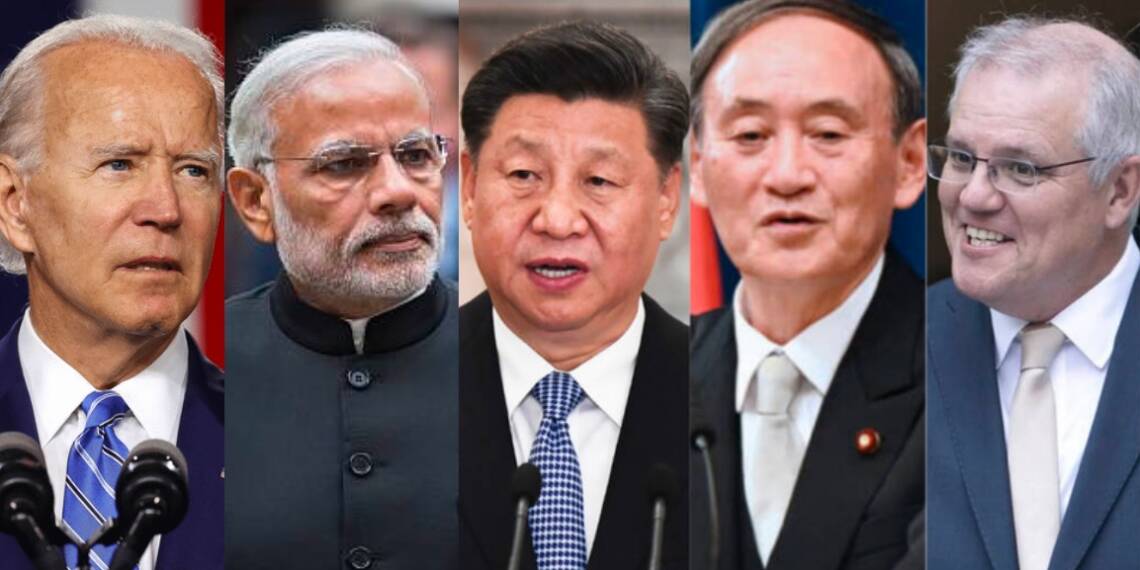The Quadrilateral Security Dialogue, or what is more commonly known as the Quad, has decided to end China’s global domination dreams with a single move- restructuring semiconductor supply chains. This is bound to isolate China’s tech industry completely, in lack of the crucial electronic component.
Quad leaders to call for securing chip supply chains
Quad leaders representing the US, India, Japan and Australia are set to meet for the Quad summit in Washington next week. They will discuss plans to work towards a safe supply chain for semiconductors, which would imply that the Indo-Pacific alliance formed to check Chinese hegemony will cooperate amongst themselves in the semiconductors industry in a bid to completely eliminate Beijing.
Nikkei reported that a draft joint statement suggested that the four nations are likely to confirm that “resilient, diverse and secure technology supply chains for hardware, software, and services” are crucial for their shared interests.
The joint draft statement reflects an attempt by Quad to tie up technology with democratic values and thereby exclude Chinese authoritarianism. In fact, as per Nikkei, the document stated that “the way in which technology is designed, developed, governed and used should be shaped by our shared democratic values and respect for universal human rights.”
Why are semiconductors crucial for China?
For China, semiconductors are an indispensable product. The semiconductors are the most essential part of any consumer electronics and technology equipment. They are needed by all Chinese tech sector enterprises, be it a tech major like Huawei Technologies Co. or be it one of the many Chinese cheap smartphone manufacturers. There is absolutely no chance of survival in the tech industry without semiconductors.
China dependent on democratic countries for semiconductors
China is however completely dependent on imports for sustaining its inflating semiconductor demand. This is where the Quad becomes crucial. The U.S. and Japan alone account for 30 percent of the world’s chipmaking capacity. Chipmaking powerhouses like Intel and Qualcomm are based in the U.S.
Moreover, even other chipmaking leaders like Taiwan and South Korea are Quad’s friends and China’s adversaries. This is exactly why the Quad is trying to link semiconductor supplies with democratic values, as it directly decouples China from countries that manufacture semiconductors.
India and Australia don’t have a semiconductors manufacturing industry, but India has a colossal IT industry that can absorb semiconductor exports from Japan, the US and other like-minded countries in order to keep China excluded from the global semiconductor supply chain.
So, if the Quad forms an alliance to regulate the semiconductors supply chain, then it is very bad news for China.
China fails to produce homegrown semiconductors
When it comes to chips, the onslaught against China had started last year itself when the Trump administration announced that it would “narrowly and strategically target Huawei’s acquisition of semiconductors”. Guo Ping, rotating chairman, at Huawei’s annual analyst conference at that time had stated, “We will now work hard to figure out how to survive,” and that “survival is the keyword for us now.”
Later, Trump decided to push the envelope and blacklisted the Semiconductor Manufacturing International Corporation (SMIC), China’s largest semiconductor manufacturer. The ban on semiconductor supplies to SMIC was bigger than the one imposed on Huawei as it has left the entire Chinese tech industry impaired.
China still remains totally dependent on American semiconductor designs for fulfilling its growing chip demand. In a bid to meet the growing demand, Chinese President Xi Jinping did try to bring in local chip manufacturers and even launched the “Star startup project” to make China a chip powerhouse. However, Xi’s plans have backfired badly with local manufacturers dumping fake and refurbished chips.
How bad is the chips situation in China?
Well, very bad. Huawei, which was once at the centre of Xi’s global domination dreams is still struggling to survive. Huawei Chairman too has accepted that the telecom major isn’t thinking of global supremacy. He said, “Our aim is to survive.”
Huawei has limited supplies of state-of-the-art semiconductors. The semiconductors stock will get exhausted next year, after which Huawei’s very survival will be at stake. And Huawei is no small company. It is China’s biggest smartphones maker, and if it is facing such paucity of semiconductors, you can only imagine how bad would the situation be for smaller telecom equipment maker.
The Chinese tech industry is already reeling under the lack of semiconductors supply. And now, Quad is launching a fresh war in the strategically crucial sector which might as well be the last nail in the coffin for China’s tech domination dreams.








